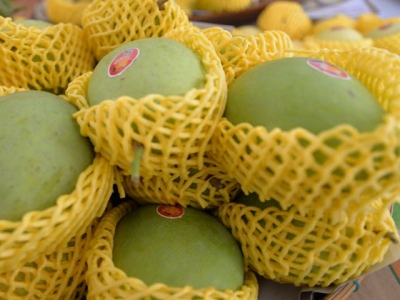Global market share of Vietnamese mangoes remains modest

Despite recording impressive growth in recent times, the global market share of Vietnamese mangoes stays modest, as the value of its mango exports last year reached over US$180 million out of a total global export value of US$12.3 billion, according to the Agro Processing and Market Development Authority.
The Agro Processing and Market Development Authority (Agrotrade) states that Vietnamese mango export turnover endured a drop of 9% to US$180.8 million last year in comparison to 2019. The fall is largely caused by the impact of the COVID-19 pandemic interrupting the flow of goods globally.
At present, China is the largest consumer of Vietnamese mangoes, with turnover reaching US$151.8 million, or 83.95% of Vietnam's total export turnover. It is followed by Russia, Papua New Guinea, the United States, the Republic of Korea (RoK), the EU, Japan, and Hong Kong (China).
Most notably, several demanding markets, including the US, the RoK, and Australia have moved to increase their import of Vietnamese mangoes.
According to statistics released by the Ministry of Industry and Trade, Vietnam represents the 14th largest mango supplier to the US, shipping 2,100 tonnes worth US$4.61 million last year, up 66% in volume and 70.1% in value compared to 2019.
The average import price from the country is relatively high at US$2.2 per kilo, representing an increase of 2.5% compared to figures from 2019. Despite this growth, the market share of local mangoes continues to remain low, accounting for only 0.3% of the US’ total mango imports. Fresh and frozen mangoes are popular export items.
Moreover, Vietnam ranks fourth among the largest mango suppliers to the RoK, making up 6.2% of their total mango imports.
At present, Vietnamese mangoes enjoy plenty of advantages after the products were licensed to enter the US and Australia due to the use of 30-day storage technology. Additionally, tax preferences from numerous free trade agreements Vietnam has signed with its partners make it easier for the local fruit to access both regional and global markets.
Experts have therefore underscored the importance of the development of value chains by strengthening connectivity among producers, buyers, and export businesses, along with processing and packaging stages, in line with the stringent regulations set out by foreign importers.
The Ministry of Agriculture and Rural Development has also recommended that localities continue to register mango-growing areas whilst issuing codes of farming zones, and apply competent agricultural practices in production.
Related news
Tools

Phối trộn thức ăn chăn nuôi

Pha dung dịch thủy canh

Định mức cho tôm ăn

Phối trộn phân bón NPK

Xác định tỷ lệ tôm sống

Chuyển đổi đơn vị phân bón

Xác định công suất sục khí

Chuyển đổi đơn vị tôm

Tính diện tích nhà kính

Tính thể tích ao




 Opportunities to develop agricultural materials domestically
Opportunities to develop agricultural materials domestically  Foreign merchants register to purchase lychees in Vietnam
Foreign merchants register to purchase lychees in Vietnam